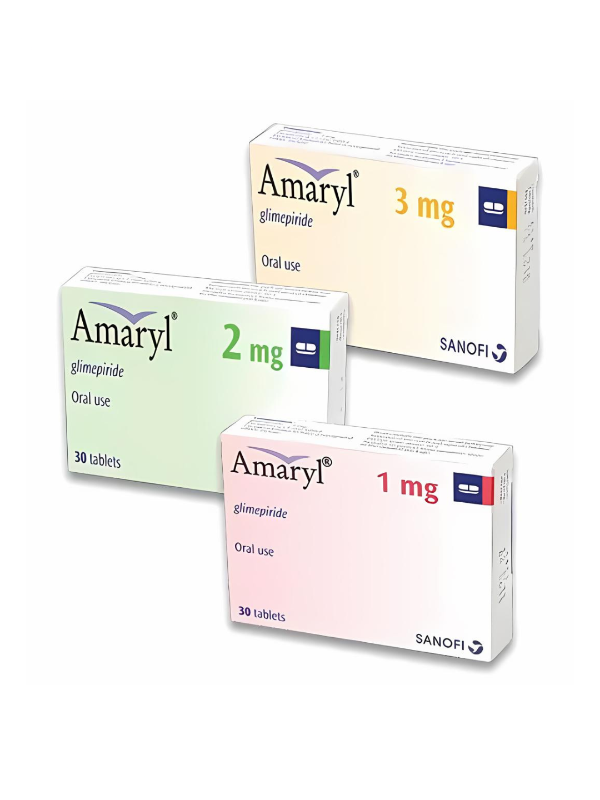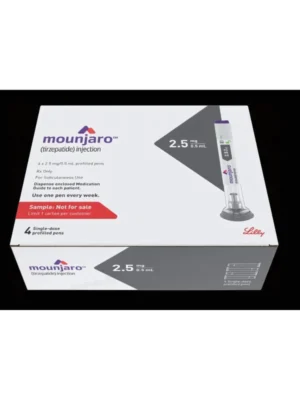Description
Amaryl Tablet (Glimepiride) – Treatment for Type 2 Diabetes Mellitus
Amaryl Tablet is a trusted sulfonylurea-class medication prescribed to manage Type 2 Diabetes Mellitus in adults. It effectively controls blood sugar levels, reducing the risk of severe diabetes complications like kidney damage, blindness, and nerve disorders. This medicine stimulates insulin release from the pancreas, helping regulate glucose metabolism. It should be taken just before or with the first meal of the day for optimal absorption. Consistency is key—take it at the same time daily as prescribed by your doctor. It can be used alone or alongside other antidiabetic medications. However, it must be combined with a healthy diet, exercise, and weight management for best results. Never stop taking it without medical advice, as uncontrolled blood sugar can lead to serious health risks.
Uses of Amaryl Tablet:
- Management of Type 2 Diabetes Mellitus
- Helps lower blood sugar levels
- Prevents diabetes-related complications
Benefits of Amaryl Tablet:
- Effectively controls high blood sugar
- Reduces risk of diabetic complications
- Supports long-term diabetes management
Side Effects of Amaryl Tablet:
- Hypoglycemia (low blood sugar) – sweating, dizziness, shaking
- Headache
- Nausea
- Dizziness
- Weakness
Most side effects are temporary. Consult your doctor if they persist.
How to Use Amaryl Tablet?
Take 1-2 mg once daily with breakfast or the first meal. Swallow the tablet whole—do not crush or chew. Follow your doctor’s prescribed dosage, which may adjust based on blood sugar levels. Never skip meals while on this medication.
How Amaryl Tablet Works?
The Tablet (Glimepiride) is a sulfonylurea antidiabetic drug that stimulates the pancreas to release insulin, helping lower blood glucose levels. It improves the body’s response to insulin, aiding in better sugar metabolism.
Safety Advice:
- Alcohol: UNSAFE – Increases hypoglycemia risk.
- Pregnancy: Consult a doctor—may harm the baby.
- Breastfeeding: Likely unsafe—limited data shows passage into breast milk.
- Driving: Use caution—low blood sugar can impair alertness.
- Kidney/Liver Disease: Dose adjustments needed; avoid in severe cases.
What If You Miss a Dose?
If you forget a dose, skip it and resume the next dose at the usual time. Do not double the dose to compensate.
FAQs:
Q1: What is the usual dosage of Amaryl Tablet?
The starting dose is 1-2 mg once daily, adjusted based on blood sugar levels. The max dose is 8 mg/day.
Q2: Does Amaryl Tablet cause weight gain?
Yes, some patients may experience mild weight gain due to increased insulin release.
Q3: Can I take Amaryl Tablet on an empty stomach?
No—always take it with food to avoid hypoglycemia.
Q4: Is Amaryl safe for kidneys?
Avoid in severe kidney disease—it’s excreted through kidneys.
Q5: How long does it take to work?
It starts lowering blood sugar within 2-3 hours, but full effects take consistent use.
Q6: Can I stop Amaryl if my sugar is controlled?
No—sudden discontinuation can worsen diabetes. Always consult your doctor.
Q7: Does Amaryl cause dizziness?
Yes, due to possible low blood sugar. Always carry a sugary snack.
Q8: Who should avoid Amaryl Tablet?
Patients with Type 1 Diabetes, severe kidney/liver disease, or allergies to sulfonylureas.








There are no reviews yet.